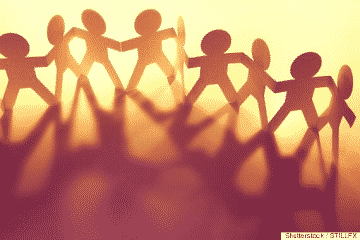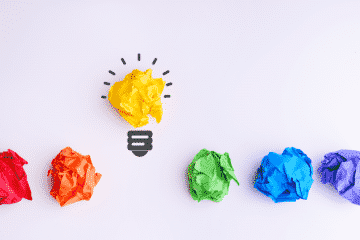How Did Social Media Appear?
It is impossible to imagine our life in the modern world without social media. Facebook, Instagram, and Twitter are popular not only in Europe or America, but even people from the farthest corners of the world have at least heard about them! But things weren’t always like that.
The strong candidate which claims for the title “the first site which used the paradigm of modern social media” is called sixdegrees. It allowed users to create profiles and share different kinds of information with people who were on their friendlists.

It came on the scene in 1997 and was really ahead of its time. Less than 2% of the world’s population had access to the Internet back then and, therefore, just couldn’t keep the site working. Unfortunately, it had to close its digital doors in 2001.
In the early 2000s another trend appeared and caught on. MySpace was the original social media profile website leading into inspiring networks like Facebook. In 2004 Mark Zuckerberg launched what would soon become the social media giant that would set the bar for all other services alike.
Inspired by the popularity of text messaging, in 2006 Jack Dorsey, Biz Stone, Noah Glass and Evan Williams created Twitter, which is now well-known as a service that has the unique distinction of allowing users to send tweets with a 280-character limit.
Instagram is perhaps the most defining app of the previous decade. It was developed by Kevin Systrom and Mike Krieger and launched in 2010. Its growth was nearly instantaneous. From a handful of users, it soon became the number one photography app increasing to 1 million users in two months. It went on to be bought by Facebook for $1 billion in 2012.
In September of 2016 TikTok blasted on the social media scene, quickly growing to become an international hit and a platform most popular among Generation Z, capable of competing with aforementioned social media giants. It emerged from two apps: musical.ly and Douyin, and has demonstrated a lot of staying power due to the content in the form of short dancing, educational or comedy videos.
Why Is Social Media So Addictive
The fact that social media has become an integral part of our lives is not surprising. It seems natural to post, share, like, dislike, follow, unfollow, comment… But what if we say that all people are just addicts, hooked on a natural chemical produced in our brains?
When someone likes our Instagram picture or the retweet notification pops up, it all goes back to something called dopamine. This “drug” dispenser is pre-built into our bodies. It’s the reward and pleasure brain chemical, linked to love, lust and sex.

Here’s how it works. Technically, dopamine is a neurotransmitter. It’s a messenger, carrying information from one neuron to another. That could be: “Oh my God, I just saw my favourite chocolate-chip biscuits. The more the better”.
Drugs like cocaine and amphetamines allow extra dopamine to remain in your brain longer than normal, resulting in heightened feelings of pleasure and a need for more. It not only rewards us but makes us anticipate future pleasure, like the first bite of that second biscuit.
Big tech is well aware of how this works — it’s the pleasure-pain-repeat cycle.
When the brain gets used to a higher level of dopamine, it wants us to keep seeking out that addictive substance or habit for more. This is called the dopamine loop. Post something on Facebook, and chances are friends begin to “like” or “comment” almost immediately. Send a text — getting a quick response can be a short burst of ecstasy.
As you can see, the point about social media is the addictiveness. Nobody really wants to spend hours and hours every day updating their status and seeing what other people think about them. Nobody consciously wants to do that, but those behaviours are themselves addictive behaviours.
Dopamine starts at “seeking” behavior in each example. Then you get rewarded, which makes you seek more, do it again and again. Once you’re trapped in that loop it’s very hard to break out.
What Is So Dangerous About It
You may be wondering: “Okay, I see that social media is designed to be addictive, but I can’t understand in what way it can be harmful”. Let’s make it clear.
What comes to mind first when we hear of damage caused by social media is some purely psychological negative effects, such as becoming too busy with editing your life to appear perfect on Instagram and not appreciating moments for what they are, dependence on positive reinforcement from outside, struggle with feeling happy, jealousy cycle, loss of motivation, etc.

But excessive usage of social media can result in dire consequences for your health, interfering into the work of your brain and body. It is especially important to know for parents, when it comes to teenage addiction to social media. The most common issues are: poor posture, myopia, increased chances of developing ADHD (attention deficit hyperactivity syndrome) symptoms and “compulsion loop” (the same loop responsible for the behaviours associated with nicotine or cocaine), sleep problems.
We also see a change in brain patterns: alpha rhythms are commonly associated with wakefulness like when your mind just roams, whereas gamma waves are associated with conscious attentiveness. And experiments have shown that phone transmissions can literally change the way your brain functions, significantly boosting the power of alpha waves.
“Am I Addicted Too?”
In case you are now worried about your mental health and need some signs to recognize the addiction, here they are:
- Your self-esteem is dependent on the feedback you receive on social media. You don’t feel validated enough if your amount of likes and comments is below usual. But your presence and activity on Facebook or Instagram shouldn’t define what kind of person you are.
- Have you ever found yourself scrolling the news feed unconsciously, just being driven by habit, not even realizing what you are doing that for? That is another sign of addiction.
- Talking to real people doesn’t seem as entertaining as surfing the Internet, so your offline relationships and connections start falling apart.
- You use your smartphone first thing in the morning and before falling asleep in bed. You feel as if you are missing something when you don’t check your notifications or scroll the feed as soon as you wake up, so this process becomes a part of your daily habits. The truth is, such behaviour affects your sleep patterns in a bad way.
- Living your day-to-day routine makes you feel bored. Videos, memes, and pictures become your constant source of entertainment. It’s natural, of course, they are often really funny and witty. But not if interest in life is the cost.
- Thoughts about your next post take too much time. You are carefully thinking through the best way to present yourself, thoroughly choose the wording, take fifty photos to pick up only one and, basically, experience things just to portray a particular image on social media.

“How Can I Overcome My Addiction?”
If you recognize yourself in above-named signs and want to be less obsessed, the following pieces of advice might be helpful:
- go into your mobile phone’s settings and turn off notifications to prevent craving for answering DMs or replying to comments at once from establishing;
- redesign your phone’s home screen to remove all social media apps from it;
- try using Instagram, Facebook, and Twitter on your computer and deleting them from your phone for a while;
- limit these apps to a specific time of a day, treating them like something you do only in a peculiar place and at a peculiar moment – app blocking tools may come in handy;
- journal your experience of quitting social media to keep yourself focused and on track;
- find a topic which you are curious about and explore it instead of mindless scrolling – you could make use of this article on the subject of ethical subjectivism and emotivism;
- write a to-do list of activities you always wanted to be involved in, but never had time, and realize how much you are missing out because of being stuck on Instagram (or whatever);
- block certain features of the app with Todobook – it will work when you need the messenger tool, the events tool, or the groups tool, but the news feed appears valueless;
- delete or deactivate your account to reduce temptation;
- keep your smartphone in a separate room;
- install a Forest app on your phone;
- get inspiration and more tips from other people’s social media addiction stories and how they managed to combat it – this one’s a great example:
https://www.youtube.com/watch?v=fkIygLMFcI8
Reasons for Quitting Social Media
Such a question must be bothering you now: “But what would I do all this stuff for?”
Well, the benefits are obvious: you will have a better concentration, learn more deeply, be creative, abandon FOMO (fear of missing out), remove fake people and relationships, stop comparing yourself to others, and, therefore, feel happier.
Social Media Addiction Memes
Since it has become a wide-spread issue, people tend to make fun of this addiction for it not to look so frightening. This way it’s easier to get rid of it. Let’s have a good laugh too!




Quotes About Social Media Addiction
To give you even more motivation to make some positive changes in your life, we leave you with these stimulating and thought-provoking quotes to reflect on:
“When we go online, we enter an environment that promotes cursory reading, hurried and distracted thinking, and superficial learning.
Nicholas Carr
“The internet is a dangerous place. If you are not careful it will consume you and rob you of your happiness. It can make you angry, jealous, hostile, bitter and lead to the eventual loss of enthusiasm for living your best life. Be wary and avoid overconsumption.”
Germany Kent
“If any of the great avatars – Buddha, Jesus, Khrishna, Mohammed – were present in human form on this planet today, what would they be doing? I doubt they would be posting selfies.”
Anthon St. Maarten
“Humans are lamentably insecure creatures, and often they pick up their modern devices to alleviate that insecurity, in a subconscious attempt to receive some thrill and reward. And the longer we keep on practicing such a habit, the more hooked we get to our devices, often to the point of losing our mental stability. So, devices that were mainly invented as means of communication have become weapons of mental devastation.”
Abhijit Naskar, The Gospel of Technology
Make sure you’re also HAPPY in Real Life and NOT just on Social Media.”
PK Kasirim
FAQ
What is social media addiction?
Social media addiction is a phenomenon when you start being extremely concerned about social media to the point when it impairs your real life, productivity, and relationships with people. You feel an uncontrollable urge to check your feed, answer DMs, reply to comments, watch stories, read posts, etc.
How to quit social media addiction?
Use all the tips that we shared with you above and be prepared for extra-time you will have when you actually quit being addicted to all social media! But remember: slip-ups are okay, just give yourself time to draw some conclusions and move on!
What is the social media addiction scale?
The BSMAS, or Bergen Social Media Addiction Scale is a six-item scale which appears an effective and a brief psychometric instrument for assessing your risks to become addicted to social media on the Internet.
What are the best books about social media addiction?
Nicholas Carr “The Shallows: What the Internet Is Doing to Our Brains”
Carr makes a really critical point in his book. He says that not just social media, but the internet as a whole rewards us for shallow thinking.
Jaron Lanier “Ten Arguments for Deleting Your Social Media Accounts Right Now”
Lanier dares to demonstrate the ways in which our social media accounts make us products, not consumers.
Adam Alter “Irresistible: The Rise of Addictive Technology and the Business of Keeping Us Hooked”
Alter highlights the new obsessions that took control over our lives and offers the necessary tools to rescue our businesses, families, and sanity.






Instagram takes up a lot of my time. Very, very much. I once had a case when I used my smartphone all day long. Literally. Therefore, now I try to limit and control my media traffic, although sometimes it does not work out very well. Therefore, I wish everyone to get out of the way and look at the world, and not at the virtual world of a black screen.
nice poste..